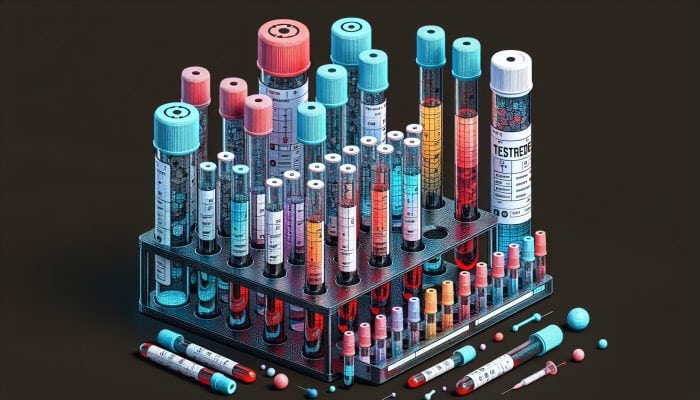Discover the Importance of a Testosterone Blood Test for Your Overall Health
Essential Measurements in a Testosterone Blood Test to Ensure Optimal Well-being

The Testosterone Blood Test in Wakefield serves as a crucial diagnostic tool designed to assess the levels of <a href="https://ad4sc.com/testosterone-blood-test-essential-guide-for-swindon-residents/"><a href="https://limitsofstrategy.com/testosterone-blood-test-guide-for-swindon-residents/">testosterone</a></a> circulating within your bloodstream. This significant hormone plays a vital role in several physiological functions, particularly for men. The test is key in diagnosing conditions like hypogonadism, which occurs when the body does not produce sufficient testosterone levels. Moreover, the outcomes of this test are invaluable in assessing the effectiveness of hormone therapy, allowing healthcare providers to customize treatments for individuals undergoing testosterone replacement therapy. By acquiring accurate readings, patients receive essential insights into their hormonal health, which is foundational for effective health management and overall wellness.
Understanding the intricacies of testosterone levels, particularly the distinctions between total and free testosterone, provides significant insights into an individual's hormonal health status. Total testosterone represents the complete amount of the hormone present in the bloodstream, while free testosterone indicates the active form that can penetrate cells and exert its influence. By evaluating both total and free testosterone levels, healthcare professionals can gain a holistic perspective on a patient’s health, facilitating targeted interventions when necessary for improved health outcomes.
Regular testing is not solely for individuals already diagnosed with hormonal imbalances. It can also provide substantial benefits for those experiencing vague symptoms related to fluctuating testosterone levels. Therefore, understanding the details of what this test measures is the essential first step toward improving one’s hormonal health and enhancing overall wellness.
Identifying Who Should Consider a Testosterone Blood Test for Enhanced Health
Men displaying symptoms that may suggest low testosterone levels should strongly consider undergoing a testosterone blood test. Common indicators of low testosterone include chronic fatigue, a decrease in libido, and noticeable loss of muscle mass—factors that can significantly diminish one's quality of life. Additionally, symptoms such as mood swings, depression, and difficulties with concentration may signal underlying hormonal imbalances that warrant further examination and intervention.
While testosterone levels typically decline as men age, younger men may also encounter low levels due to various factors, including stress, obesity, and certain medical conditions. Thus, men who observe changes in their physical or mental health should promptly consult a healthcare provider to discuss the potential need for testing. By recognizing these signs early, individuals can adopt proactive measures to manage their health and enhance their overall well-being more effectively.
It is vital for men experiencing any of these symptoms to take a proactive stance regarding their health. A testosterone blood test is a straightforward yet powerful tool for gaining insights into one’s hormonal wellness, empowering individuals to make informed decisions about lifestyle changes or medical interventions designed to improve their overall well-being.
Preparing Effectively for a Testosterone Blood Test: Essential Steps
Proper preparation for a testosterone blood test is crucial, involving adherence to several key guidelines to ensure the accuracy of results. Typically, fasting for a minimum of 8 to 12 hours before the test is recommended, requiring individuals to abstain from food during this timeframe. Additionally, staying well-hydrated is equally important, as water does not interfere with testosterone levels and aids in the blood draw process, making it easier for healthcare professionals to collect the necessary samples without complication.
Moreover, it is essential to inform your healthcare provider about any medications you are currently taking, as certain prescription and over-the-counter drugs can influence testosterone levels. Medications such as steroids, opioids, and even specific herbal supplements may alter the results, potentially compromising your hormonal health assessment and leading to misinterpretation.
Furthermore, it is advisable to refrain from engaging in intense physical or sexual activity within the 24 hours leading up to the test, as these activities can temporarily elevate testosterone levels. By diligently adhering to these guidelines, individuals can help ensure that their testosterone blood test results are as accurate as possible, facilitating informed healthcare decisions and effective management of their health.
Optimal Timing for a Testosterone Blood Test: Understanding the Best Practices

The timing of a testosterone blood test is a crucial factor in obtaining accurate testosterone level readings. It is generally advised that these tests be performed in the morning, specifically between 7 a.m. and 10 a.m., when testosterone levels naturally peak. Understanding this physiological rhythm is critical; testosterone levels can decline significantly throughout the day, leading to misleading interpretations of test results if not taken into account.
For men actively monitoring hormone levels or those receiving treatment for testosterone deficiencies, annual testing is often recommended. However, the frequency of testing may vary based on individual health conditions, age, and the presence of specific symptoms. If a patient is experiencing new symptoms or has undergone alterations in their treatment regimen, more frequent testing may be necessary to ensure optimal management of their hormonal health.
Grasping the appropriate timing for conducting a testosterone blood test is essential for effective monitoring and treatment. By scheduling tests during peak hormone levels, both individuals and healthcare providers can obtain clearer, more reliable insights into hormonal health, ultimately enhancing patient care and outcomes.
Expert Perspectives on Testosterone Blood Testing in Wakefield
Cutting-Edge Developments Revolutionizing Testosterone Testing
Recent advancements in testosterone testing have transformed the accuracy and convenience of hormone assessments. Technological innovations have led to more precise measurements of both free and total testosterone levels, resulting in more reliable diagnostics. Some notable advancements in this field include:
- At-home testing kits: Many individuals now have access to reliable at-home testing kits that ensure privacy and convenience, allowing for effective self-management of hormonal health.
- Enhanced laboratory techniques: Advanced methodologies such as LC-MS/MS (liquid chromatography-tandem mass spectrometry) provide significantly more accurate results compared to traditional testing methods.
- Comprehensive hormone panels: New testing panels now evaluate additional hormones, offering a broader perspective on hormonal health and balance, which is crucial for effective treatment planning.
- Integration of telehealth services: Numerous clinics now offer consultations via telehealth platforms, simplifying the process of discussing results and exploring treatment options.
These innovations reflect an increasing recognition of the critical importance of hormonal health. Local clinics in Wakefield have begun to embrace these cutting-edge technologies, enhancing residents' access to advanced testing methods and improving health outcomes. With these advancements, patients can anticipate more personalized and effective healthcare solutions regarding testosterone management, ultimately leading to better overall health and satisfaction.
How Local Specialists in Wakefield Can Support Your Health Journey

Local endocrinologists and general practitioners in Wakefield stand as invaluable resources for interpreting testosterone test results. These healthcare professionals possess extensive expertise in hormonal health and the implications associated with various testing outcomes. They can clarify what the results indicate within the context of an individual’s overall health and lifestyle choices, ensuring that patients receive comprehensive care tailored to their specific needs and circumstances.
A significant advantage of consulting local experts lies in their understanding of community health trends. They can provide recommendations specifically tailored to the unique health challenges and needs of the Wakefield population, ensuring that their advice is both relevant and effective. Furthermore, these professionals often collaborate with other specialists, promoting a holistic approach to care that addresses all aspects of hormonal health.
Moreover, local healthcare providers can assist in developing personalized treatment plans that cater to the unique circumstances of each individual, whether this involves lifestyle alterations, further testing, or hormone replacement therapy. By leveraging the expertise of local professionals, patients can make informed decisions that significantly enhance their health and well-being.
Steps to Take After Receiving Your Testosterone Test Results
Upon receiving testosterone test results, the subsequent steps largely depend on the findings. If testosterone levels are found to be low, consulting a healthcare provider is imperative to discuss potential treatment options. These options may include lifestyle modifications, such as dietary improvements and increased physical activity, or considering hormone replacement therapy, which can markedly elevate overall well-being and vitality.
For individuals with borderline results, a healthcare provider may recommend a regimen of regular monitoring to observe trends over time. Lifestyle changes can also play a crucial role in managing testosterone levels, including increasing physical activity, reducing stress, and ensuring adequate restorative sleep. Each of these factors contributes significantly to optimizing hormonal health and enhancing overall quality of life.
If results fall within the normal range yet symptoms persist, it may be beneficial to explore other underlying causes in consultation with a specialist. This comprehensive approach guarantees a thorough understanding of one’s health, preventing overlooked issues that could lead to further complications. Ultimately, taking proactive steps based on test results is vital for effective long-term health management and well-being.
Where to Access Testosterone Blood Testing Services in Wakefield
In Wakefield, numerous clinics and laboratories provide testosterone blood testing services, ensuring residents have easy access to this essential component of healthcare. Some notable locations include:
- Pinderfields Hospital: A well-established facility known for delivering comprehensive hormone testing services and expert care.
- The Doctors Laboratory: A private laboratory recognized for its advanced testing techniques and quick turnaround times, ensuring timely results.
- Wakefield District Health and Care Partnership: Offers a range of services, including testosterone testing, to address community health needs effectively.
- Local GP surgeries: Many general practitioners can facilitate testing and provide necessary follow-up care, ensuring continuity of health management and support.
These facilities are equipped with modern technology and staffed by knowledgeable professionals committed to delivering high-quality care. It is advisable to contact these locations directly to inquire about testing protocols, associated costs, and appointment availability to ensure a smooth and efficient testing experience.
Determining the Frequency of Monitoring Your Testosterone Levels
Regular monitoring of testosterone levels is essential for effective health management, particularly for those diagnosed with testosterone deficiencies. The recommended frequency of testing often hinges on individual factors, including age, overall health status, and any underlying conditions that may exist.
For men over the age of 40 or those with existing hormonal issues, annual testing is generally advisable to monitor changes and ensure optimal hormonal health. Younger men exhibiting symptoms of low testosterone may also benefit from periodic assessments, especially if they are undergoing lifestyle changes or treatments aimed at enhancing hormonal balance and well-being.
Moreover, if testosterone replacement therapy is initiated, more frequent monitoring becomes necessary to assess the therapy’s effectiveness and adjust dosages as needed. By remaining vigilant through regular testing, individuals can maintain optimal testosterone levels and avert potential health complications associated with hormonal imbalances over time.
Steps to Access a Testosterone Blood Test in Wakefield
Clinics Offering Testosterone Testing Services in Wakefield
A variety of clinics in Wakefield are equipped to conduct testosterone blood tests, providing essential services for those seeking to enhance their understanding of their hormonal health. Key clinics include:
- Pinderfields Hospital: Renowned for its comprehensive healthcare services, this facility provides hormone testing as part of its extensive offerings.
- The Doctors Laboratory: A private lab that excels in providing advanced testing and quick turnaround times for results, ensuring efficiency and reliability.
- Wakefield Primary Care Network: Local GP surgeries that facilitate tests and provide follow-up consultations to ensure continuity of care and patient support.
- Private medical centres: Various private clinics offering testosterone testing, typically with a more personalized approach to patient care and management.
These facilities present residents with a vast array of options, whether they prefer NHS services or private healthcare. It is advisable to contact these clinics directly to verify availability and specific testing requirements to ensure a smooth and effective testing experience.
Understanding the Cost of a Testosterone Blood Test in Wakefield
The cost of a testosterone blood test in Wakefield can vary significantly depending on whether one opts for NHS services or private clinics. Generally, NHS tests are offered free of charge; however, waiting times may be longer due to high demand and resource constraints.
Conversely, private clinics may charge anywhere from £50 to £100, based on the specific services included in the testing. Factors influencing the cost include the type of testing conducted, whether additional hormone panels are requested, and the location of the clinic providing the service.
Patients should carefully evaluate their options, weighing the pros and cons of private versus NHS services. Regardless of the choice made, understanding the financial implications is crucial for making informed health decisions, ensuring that individuals can access the care they need without unnecessary financial strain or stress.
Exploring Convenient At-Home Testing Solutions for Testosterone Levels
Yes, numerous companies offer at-home testosterone testing kits, which can be conveniently purchased online. These kits empower individuals to collect a blood sample in the comfort and privacy of their own homes. After the sample is collected, it is sent back to a laboratory for thorough analysis and results.
At-home testing kits provide an excellent alternative for those who may find it challenging to visit a clinic due to mobility issues, time constraints, or personal preference. Many of these kits are designed to deliver reliable results and often come equipped with detailed instructions for proper sample collection and handling to ensure accuracy.
However, it is essential to ensure that the at-home testing kits are sourced from reputable companies that comply with medical standards and guidelines. Consulting with a healthcare provider before utilizing at-home testing can help ensure that any subsequent actions based on the results are appropriate and beneficial for your health.
Preparing for a Testosterone Blood Test in Wakefield: Essential Guidelines
Preparation for a testosterone blood test in Wakefield generally follows similar guidelines to those mentioned earlier, yet it is crucial to confirm any specific instructions provided by the testing facility. Typically, fasting for 8 to 12 hours is advisable, and hydration should be maintained without consuming any food or drink that could interfere with the accuracy of results.
Informing the clinic about any medications you are currently taking is essential, as these could potentially affect testosterone levels and the interpretation of results. Additionally, it is recommended to avoid vigorous physical activity and sexual intercourse for at least 24 hours before the test to prevent artificially elevated testosterone levels that may skew results.
Each clinic may have its own particular requirements, so patients should consult the facility where they will be testing for any unique pre-test preparation instructions. Adhering to these guidelines will help ensure that the test results are accurate, reliable, and truly reflective of your hormonal health.
What to Expect After Your Testosterone Blood Test in Wakefield
After undergoing a testosterone blood test in Wakefield, patients can generally anticipate receiving their results within a few days to a week, depending on the clinic’s processing times and protocols. Once results are available, they are typically discussed during a follow-up appointment with a healthcare provider, who will explain the findings and their implications in detail.
During this consultation, the healthcare provider will clarify the results and what they signify within the context of the individual’s overall health and lifestyle. If testosterone levels are determined to be low or high, the provider may recommend further testing or treatment options, including lifestyle modifications or hormone replacement therapy, to help restore hormonal balance and improve overall health.
Understanding what to expect after the test can alleviate anxiety for many patients. Being proactive in discussing results ensures that individuals can make informed decisions regarding their health and the necessary next steps in their ongoing care and treatment.
Comprehensive Advantages of Undergoing a Testosterone Blood Test
Boosting Your Health with a Testosterone Blood Test
A testosterone blood test can significantly enhance overall health by identifying low testosterone levels and facilitating timely interventions. Recognizing hormonal deficiencies enables individuals to access treatments that improve energy levels, emotional stability, and sexual function, all of which contribute to a superior quality of life and well-being.
Addressing low testosterone not only boosts physical health but can also profoundly impact mental well-being. Many men report improvements in self-esteem and cognitive function following treatment for low testosterone levels. Additionally, these treatments can promote muscle mass and strength, encouraging a more active and fulfilling lifestyle that enhances overall quality of life.
Overall, the advantages of identifying and correcting testosterone deficiencies extend beyond mere symptom relief. They encompass a holistic approach to health, addressing physical, emotional, and psychological aspects of well-being, ultimately leading to a higher quality of life and better health outcomes over time.
How Testosterone Blood Tests Play a Role in Addressing Fertility Challenges
Indeed, a testosterone blood test can be instrumental in diagnosing fertility issues among men. Low testosterone levels can significantly impair sperm production, leading to challenges in conception and reproductive health. Conditions such as hypogonadism, characterized by insufficient testosterone production, can directly affect fertility potential, making testing crucial.
Understanding testosterone levels can guide healthcare providers in formulating appropriate treatment plans tailored to the individual’s specific needs. If low testosterone is identified as a contributing factor to infertility, interventions such as hormone therapy may be suggested to improve reproductive health. This proactive approach can significantly enhance the chances of achieving reproductive goals.
Moreover, a testosterone blood test can help identify other underlying conditions that may negatively affect fertility, allowing for a comprehensive treatment approach. Therefore, for men facing fertility challenges, a testosterone blood test is an essential step toward discovering effective solutions and achieving their reproductive aspirations.
Potential Lifestyle Changes Following Your Test Results
The outcomes of a testosterone blood test can provide valuable insights that guide individuals toward lifestyle modifications aimed at maintaining or improving testosterone levels. Depending on the results, men might consider adopting a healthier diet rich in essential nutrients, engaging in regular physical activity, and effectively managing stress levels to promote hormonal balance and overall wellness.
Incorporating strength training and cardiovascular exercises into one’s routine can enhance hormonal balance and improve overall fitness, contributing to better health outcomes. Furthermore, ensuring adequate sleep is crucial, as poor sleep quality can negatively impact testosterone production, leading to further complications and health issues over time.
Additionally, reducing alcohol consumption and quitting smoking can significantly contribute to healthier testosterone levels. Each of these lifestyle changes supports not only hormonal health but overall well-being, promoting a more active, fulfilling, and health-conscious life.
Research-Backed Benefits of Testosterone Blood Testing in Wakefield
Insights from Studies on Testosterone Levels and Health Benefits
Research indicates that maintaining optimal testosterone levels is associated with numerous health benefits. Studies have shown that men with balanced testosterone levels experience a lower risk of heart disease and improved bone density. Furthermore, optimal testosterone levels correlate with better metabolic health, significantly reducing the risk of obesity and type 2 diabetes, leading to a healthier lifestyle overall.
Real-world examples illustrate that men undergoing testosterone replacement therapy often report remarkable improvements in their overall health metrics, including cholesterol levels and blood pressure. By identifying and addressing low testosterone, these studies reinforce the notion that proactive monitoring can lead to enhanced health outcomes and an improved quality of life.
Understanding the relationship between testosterone levels and health empowers individuals to make informed decisions regarding testing and treatment, ultimately fostering a healthier lifestyle and preventing potential health issues in the future.
Understanding How Age Affects Testosterone Levels
Testosterone levels naturally decline with age, typically beginning in a man’s late 30s to early 40s. This decline may lead to various health challenges, including decreased energy levels, reduced muscle mass, and an increased risk of metabolic syndrome, complicating overall health management and quality of life.
The age-related decrease in testosterone can also negatively impact mental health, potentially leading to symptoms of depression or anxiety in some men. Recognizing this decline is crucial, as it encourages proactive health management, including regular testing and lifestyle adjustments aimed at mitigating the impacts of aging on hormonal health.
Expert analysis suggests that maintaining testosterone levels through healthy lifestyle habits can alleviate some of the age-related changes, promoting improved vitality and overall health as men progress through the aging process.
Long-Term Benefits of Regularly Monitoring Testosterone Levels
Regular monitoring of testosterone levels is instrumental in preventing potential health complications such as osteoporosis and metabolic syndrome. By ensuring testosterone levels remain within a healthy range, individuals can significantly reduce risks associated with low testosterone, including bone density loss and cardiovascular issues that may arise over time.
Moreover, ongoing monitoring allows for timely interventions, ensuring that any fluctuations in testosterone levels are addressed before they develop into more significant health concerns. This proactive approach supports a healthier lifestyle, empowering individuals to engage actively with their health rather than waiting for symptoms to manifest.
Ultimately, the long-term benefits of monitoring testosterone extend beyond immediate health concerns; they foster a preventive mindset, equipping individuals with the knowledge and tools necessary to navigate their health effectively over time.
Decoding Your Testosterone Blood Test Results
Understanding What Constitutes Normal Testosterone Levels
Normal testosterone levels can vary by age but generally fall within the range of 270 to 1070 ng/dL for men. Understanding these ranges is crucial for accurately interpreting results. Levels that fall below this range may indicate a testosterone deficiency, while elevated levels could suggest underlying health issues that necessitate further investigation and assessment.
Individuals must discuss their results with a healthcare provider, who can provide context based on age, symptoms, and overall health. This discussion can help ensure that any necessary actions are taken based on the results, whether that means monitoring, lifestyle changes, or medical interventions aimed at correcting hormonal imbalances and enhancing health.
By understanding what constitutes normal testosterone levels, individuals can navigate their health journeys more effectively and take proactive steps toward maintaining hormonal balance and overall well-being.
Steps to Take If Your Testosterone Levels Are Low
If your testosterone levels are found to be low, the initial step is to consult with a healthcare provider to comprehensively discuss your results. They will likely evaluate your symptoms, medical history, and lifestyle factors before recommending the most appropriate treatment options tailored to your unique needs.
Treatment for low testosterone may encompass lifestyle modifications, such as improving diet and increasing physical activity, or hormone replacement therapy, which can significantly enhance energy levels, mood, and overall quality of life. These interventions can help restore hormonal balance and improve health outcomes over the long term.
Moreover, it is vital to monitor testosterone levels regularly after initiating treatment, as adjustments may be necessary to achieve the right balance. Proactively addressing low testosterone can lead to improved health outcomes, making it essential to take action based on test results and medical advice.
Understanding the Risks Associated with High Testosterone Levels
Yes, elevated testosterone levels can lead to several health issues, including acne, aggressive behavior, and an increased risk of blood clots. High testosterone levels may also result from testosterone replacement therapy or anabolic steroid misuse, necessitating careful monitoring and management by healthcare professionals.
If high testosterone levels are detected, it is critical to consult with a healthcare provider to explore the underlying causes and determine an appropriate course of action. Adjustments to any treatment protocols or lifestyle factors may be necessary to restore levels to a healthy range, ensuring that individuals remain informed and engaged in their health management and overall well-being.
Understanding the implications of high testosterone levels is essential for maintaining long-term health, as it ensures individuals can take proactive steps to address any issues that may arise and safeguard their overall wellness.
Recommended Frequency for Testing Testosterone Levels
It is generally recommended to test testosterone levels annually or as advised by a healthcare provider. Regular testing is particularly important for individuals undergoing treatment for testosterone deficiencies or those exhibiting symptoms related to hormonal imbalances, as it enables timely adjustments to treatment plans and monitoring of progress.
By remaining vigilant about testing frequency, individuals can effectively monitor changes in their testosterone levels over time and take proactive steps to maintain optimal hormonal health. The frequency of testing may also depend on age, health status, and any underlying conditions, making it essential to consult with healthcare providers for personalized recommendations and guidance.
Ultimately, the goal of regular testing is to ensure ongoing health management and to identify any potential issues before they develop into more significant concerns, thus fostering long-term well-being and vitality.
Frequently Asked Questions About Testosterone Testing
What is the Purpose of a Testosterone Blood Test?
A testosterone blood test quantifies the level of testosterone in the blood, providing critical insights into hormonal health and assisting in diagnosing conditions like hypogonadism, which can impact overall well-being and quality of life.
Who Should Consider Getting Tested for Testosterone Levels?
Men experiencing symptoms of low testosterone, such as fatigue, reduced libido, or muscle loss, should consider getting tested to assess their hormonal health and explore potential treatment options to improve their well-being.
How Should I Prepare for a Testosterone Blood Test?
Preparation typically involves fasting for several hours, staying well-hydrated, and informing your healthcare provider about any medications you take that could affect test results. This ensures accurate assessments of hormonal health and effective interpretation of results.
When is the Best Time to Get a Testosterone Blood Test?
The optimal time to undergo testing is in the morning, between 7 a.m. and 10 a.m., when testosterone levels are naturally at their peak, thus ensuring more accurate and reliable results.
Where Can I Get a Testosterone Blood Test in Wakefield?
You can obtain a testosterone blood test at various clinics in Wakefield, including Pinderfields Hospital and The Doctors Laboratory, both of which provide reliable testing services and expert care.
How Much Does a Testosterone Blood Test Cost in Wakefield?
Costs can vary significantly, with NHS tests generally provided free of charge, while private clinics may charge between £50 and £100, depending on the services included in the testing process and any additional tests required.
Are At-Home Testing Options Available for Testosterone?
Yes, several companies offer at-home testosterone testing kits, allowing individuals to conveniently collect samples and send them for analysis, providing privacy and ease of use in managing their hormonal health.
What Should I Do if My Testosterone Levels Are Low?
If testosterone levels are low, it is advisable to consult a healthcare provider to discuss potential treatment options, which may include lifestyle changes or hormone replacement therapy to restore hormonal balance and improve overall well-being.
Can High Testosterone Levels Be Harmful?
Yes, high testosterone levels can lead to health complications such as acne, aggressive behavior, and an increased risk of blood clots, necessitating thorough evaluation and management by healthcare professionals to maintain optimal health.
How Often Should I Get Tested for Testosterone Levels?
It is generally recommended to test testosterone levels annually or more frequently if advised by a healthcare provider, particularly for those undergoing treatment or experiencing symptoms related to hormonal imbalances, to ensure ongoing health management.
Connect with us on Facebook!
This Article Was First Found On https://bloodtest.co.uk
The Article Testosterone Blood Test: A Comprehensive Guide for Wakefield Residents Was Found On https://limitsofstrategy.com
The Article Testosterone Blood Test Guide for Residents of Wakefield First Appeared ON
: https://ad4sc.com

